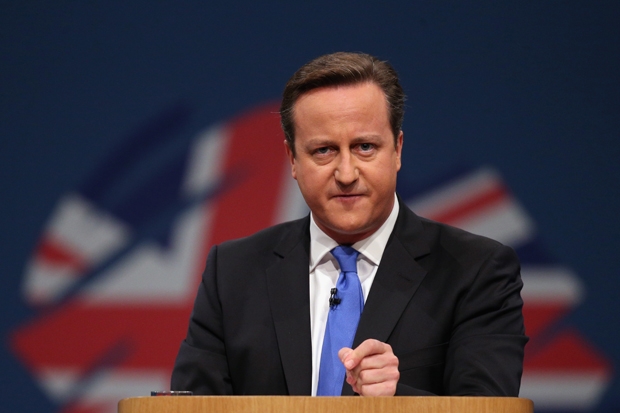Almost exactly five years ago, the Conservatives fired the starting gun for a general election — and shot themselves in the foot. ‘We can’t go on like this,’ said the poster, next to a picture of an airbrushed David Cameron. ‘I’ll cut the deficit, not the NHS.’ What on earth did it mean? No one seemed sure. As early as January 2010, it was horribly clear: here was a muddled party, preparing to fight an election campaign with a muddled message. Little wonder it ended in a muddled election result.
This time, it should be different. The Tories have a professional, Lynton Crosby, running their campaign. He should be able to point out the basics: a clear message is required, and it needs to be repeated. He is unlikely to be fooled by the received wisdom that this year’s general election will belong to the small parties. Labour and the Tories still have about two thirds of the vote, according to today’s polls, just as they did at the general election. The collapse of the Liberal Democrats has allowed peculiar phenomena such as the rise of the Greens. Overall, however, this election remains very winnable.
Anyone who believes that Ed Miliband is still cruising to victory has not kept their eye on Scotland. A Guardian/ICM poll, one of the last of 2014, suggests that Labour could lose all but three of its 41 Scottish seats to a resurgent SNP under the formidable Nicola Sturgeon. Even if she does nowhere near that well, she will still take more seats than Nigel Farage’s Ukip. The SNP already has more members than Ukip and the Liberal Democrats combined. It is Sturgeon’s party that is the new third force in British politics — and its rise comes almost exclusively at Ed Miliband’s expense.
Polls also show that Miliband is more unpopular in Scotland than elsewhere. His visits to Scotland during the referendum last year showed the sheer extent of the damage that he is capable of inflicting on his own party. All this bodes well for the Tories: David Cameron has his flaws, but he’s a good campaigner. Miliband, by contrast, can turn a bacon sandwich into a debacle.
The Tory popular vote may languish at 32 per cent in the polls, compared with 36 per cent in 2010. But support for the governing party often grows as the election draws near and the Conservatives enjoy a significant advantage on the economy, which is improving by the month. Moreover, Cameron enjoys higher personal ratings than Miliband — an advantage that can make all the difference, as when John Major unexpectedly kept out Neil Kinnock after a late swing in 1992.
If David Cameron is to remain Prime Minister, he will not do it by aping Ukip. True, Nigel Farage counts among his supporters large numbers of former Conservatives, offended in various ways by Cameron. Yet Ukip’s appeal remains as a party of protest — it offers the politics of anger. Conservatism is about the politics of answers. Do Ukip voters really want to get out of the EU? Well, Cameron’s survival is their only chance of a referendum. And Ukip’s disproportionately older voters? They should know that George Osborne has pledged (at great cost) to keep pensions high. Do they want jobs? More have been created under Cameron than under any other modern British prime minister.
Less remarked upon is that Ed Miliband’s Labour, too, has become a party of fear. The only time he has achieved real popular appeal of a level consistent with winning a majority has been with his ‘cost of living’ crisis — and he deserved credit for identifying the problem. But he has no solutions. Indeed, if Miliband has a positive message, he has not succeeded in communicating it. All he can do is shake his fist at companies, and threaten to do to them what François Hollande has done in France. We all know how well that has worked.
Elections in Britain tend to be won on the back of hope rather than fear. In spite of their battered reputation in many areas, the Tories remain the party most strongly associated with aspiration. With real incomes finally growing, it ought to be possible to concentrate minds on the prospect of self-betterment. If the Conservatives are to win, they need to be able to convince people that a Tory victory will make it more likely they will be able to buy a home of their own, afford holidays, choose a good school for their children, or have NHS services which work for them rather than the health unions.
David Cameron has every incentive, then, to go all out for a majority. He must stop pretending to have done things that he hasn’t (such as halving the deficit) and become less bashful about what his administration has done right (bringing down unemployment). The Tories do not need to resort to exaggeration or spin. Their achievements are real — though it sometimes feels as if the Prime Minister does not quite recognise them.
This election will be won or lost by David Cameron. He remains the Conservative party’s greatest asset. If he rediscovers the ability to inspire optimism that he possessed early in his leadership, there is no reason he should not lead his party to victory — a proper one, this time — in May.






Comments